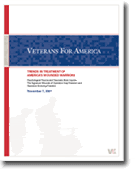VFA Releases Report on the Treatment of America's Wounded Warriors
 Released earlier this month, the Veterans For America 24-page Trends in the Treatment of America's Wounded Warriors report examines both psychological trauma and traumatic brain injuries. From VFA:
Released earlier this month, the Veterans For America 24-page Trends in the Treatment of America's Wounded Warriors report examines both psychological trauma and traumatic brain injuries. From VFA:
VFA investigators have visited every demobilization site in the United States and overseas, where they have monitored the quality of treatment, family support, rehabilitation, and other services that should enable a wounded servicemember to readjust to civilian life.
VFA has found that medical care for mental health and TBI is often inadequate or poorly delivered, and when a servicemember is discharged, decisions are often made by the military that negatively affect veterans for the rest of their lives.
VFA has also found that little consideration is given to TBI or PTSD in the military justice system despite the fact that these wounds are known to cause improper behavior. Lack of capabilities to treat these injuries, inadequate adherence to the Congressional inquiry process, and the inability or unwillingness to treat PTSD and TBI as wounds of equal legitimacy as physical injuries are some problems that require improved military leadership.
This report incorporates VFA investigative findings with open-source DoD and other reports and articles to provide a comprehensive picture of the state of care for America’s wounded warriors.



 In early January of this year, as the time for final editing of
In early January of this year, as the time for final editing of  From
From  Time has been so very short on this end, and it's late (or is that early?) as it is. It's time for peaceful slumbers, something I know that half a world away many of our troops are not blessed with tonight. Many on the home front are equally sleepless, missing loved ones at every toss and turn.
Time has been so very short on this end, and it's late (or is that early?) as it is. It's time for peaceful slumbers, something I know that half a world away many of our troops are not blessed with tonight. Many on the home front are equally sleepless, missing loved ones at every toss and turn.
 It didn't take me long to know without any hesitation whose story I needed to open the book with: James Blake Miller, aka the Marlboro Marine. I'd begun covering the issue of combat PTSD and our returning troops in September of 2005 and Miller made a deep impression on me when he came forward only a few short months later, in January 2006, to tell the world of his struggle with PTSD.
It didn't take me long to know without any hesitation whose story I needed to open the book with: James Blake Miller, aka the Marlboro Marine. I'd begun covering the issue of combat PTSD and our returning troops in September of 2005 and Miller made a deep impression on me when he came forward only a few short months later, in January 2006, to tell the world of his struggle with PTSD.
 This has been a simmering local story since September, now widening into a system-wide review. From the
This has been a simmering local story since September, now widening into a system-wide review. From the  My local paper runs a feature story on my work today. A very nice piece, which includes a Q & A and a couple of recently-taken photos.
My local paper runs a feature story on my work today. A very nice piece, which includes a Q & A and a couple of recently-taken photos.


